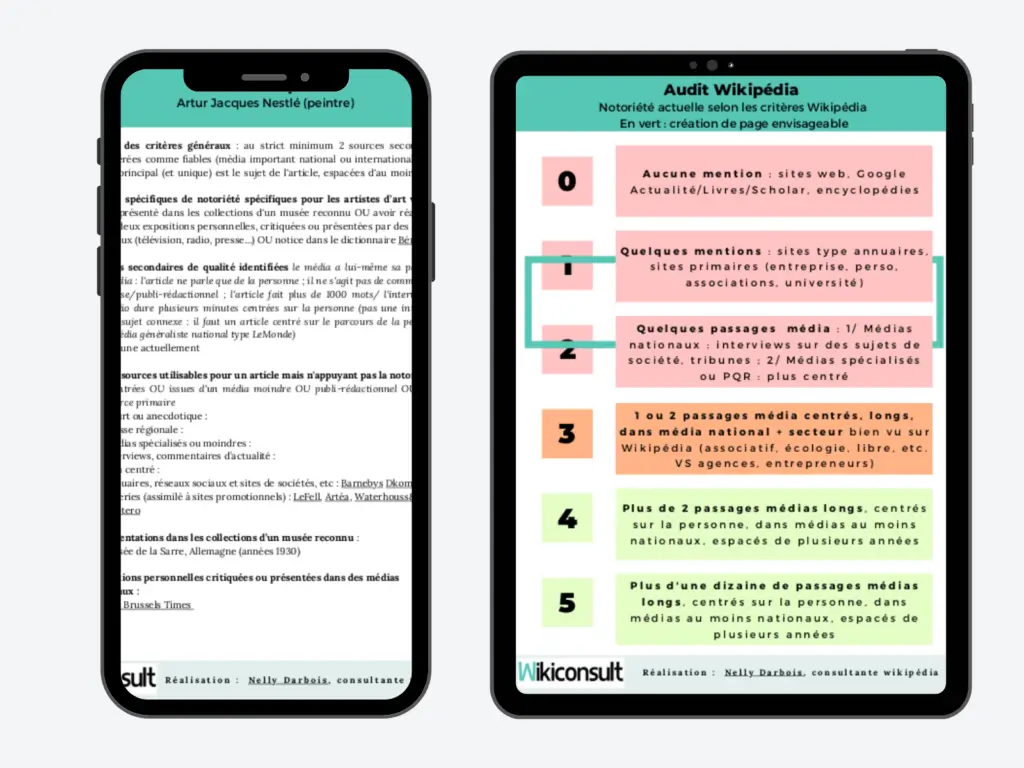For many entrepreneurs, executives, writers, and other public figures, having a Wikipedia page is a highly sought-after achievement. But what are the requirements to be included in the world’s most visited online encyclopedia?
In this article, we’ll explore Wikipedia’s notability guidelines, outline the steps to assess whether a person or entity qualifies, and suggest some alternative options.
Plan
What is Notability on Wikipedia?
Wikipedia’s concept of notability is based on strict criteria, which have been gradually developed by the community and continue to evolve. Regardless of the subject for which a Wikipedia page is being created, the most important requirement is the availability of reliable, independent secondary sources.
🚨 These sources must offer substantial information about the person and cannot come from the individual themselves or their professional associates.
In other words, the person must have been covered by national media or reputable specialist publications.
These sources should result from thorough journalistic or editorial research.
For instance, if you’re a writer, a brief interview in a local newspaper won’t suffice. However, a detailed critique of your book in a well-known literary magazine could serve as a solid foundation.
Notability Criteria on Wikipedia
Wikipedia outlines specific notability criteria for various fields, in addition to its general guidelines. The full list can be found here.
Below are some examples for several profiles:
- Writers: You must have published at least 2 self-published works that have been discussed in national academic or mainstream media, with in-depth analyses.
- Painters, sculptors, photographers and other artists: be represented in the collections of a recognized museum or have had at least two solo exhibitions, critically acclaimed or presented by national media.
- Academics and researchers: having received a nationally or internationally recognized scientific award (such as the Nobel Prize, Gold Medal, etc.), or being regarded as a leading author in the relevant field, or being credited as the originator of a widely disseminated theory.
- Entrepreneurs and managers: no specific criteria.
- SMEs, start-ups, or larger companies : the company or business is included in a notable, limited and independent company ranking, or the company’s share price is used to calculate a notable stock market index.
- Athletes: have received at least one Olympic diploma (first eight places per event) at the Olympic Games, among other criteria.
- Politicians: to qualify for a Wikipedia page, politicians must meet specific notability criteria, such as holding a significant government or legislative position, being mayor of a major city, or having extensive media coverage in well-known outlets.
Could it be that you don’t meet the specific notability criteria, or is there no suitable category for your profile (e.g., for lawyers)?
Check whether you meet the general notability criteria: has your entity been the subject of investigative content published by two media outlets of national and general scope (articles, books, TV, or radio programs, etc.) at least two years apart? This ensures a lasting reputation, not just a fleeting moment of attention.
👀Check your eligibility on Wikipedia with a notability audit
Request a comprehensive audit from us to determine your eligibility on the encyclopedia (delivered within 48 hours) or learn about alternative options that may be more relevant for your situation.
How to Apply Wikipedia’s Notability Criteria in Practice?
Before starting to create a page, it’s essential to evaluate whether the person or entity meets Wikipedia’s notability criteria.
Here’s the process:
- Identify secondary sources: Use tools like Google News, Google Scholar, Google Books, ResearchGate/ORCID, or even audiovisual archives like INA to find articles, interviews, or reviews that focus on the person or entity.
- Check media coverage: The sources should provide in-depth coverage, not just brief mentions. They must show research or analysis, be substantial in length, and focus entirely on the entity.
- Assess the temporality of sources: Ensure that sources are spaced at least two years apart or that there are multiple sources. This demonstrates that the notability is not temporary.

What if You Don’t Meet the Criteria?
It’s possible you don’t yet meet Wikipedia’s eligibility standards, but don’t worry—there are still options.
You can take proactive steps to increase your media presence. Here are some strategies tailored to your field:
- Press Relations: If you don’t have the resources in-house, partner with a press agency or freelancer to secure articles in well-regarded media outlets. At Wikiconsult, we can connect you with trusted professionals—feel free to contact us.
- Collaborations and Partnerships: Enhance your visibility by collaborating with prominent events or projects that could attract media attention.
- Industry Contributions: Publish books, academic articles in peer-reviewed journals, or engage in public events that media outlets are likely to cover.
- Be Patient: You can also choose not to be overly proactive. Since the return on investment from press relations can be hard to quantify, this approach may still be worth considering.
If you’re also interested in improving your website’s SEO ranking on Google and other search engines, creating a page on an alternative platform to Wikipedia could be an option worth exploring.

Written by Albin Guillaud
A Wikipedia contributor since 2014, with Wikiconsult I support businesses, institutions, public figures, and agencies looking to create, update, or monitor their presence on Wikipedia.